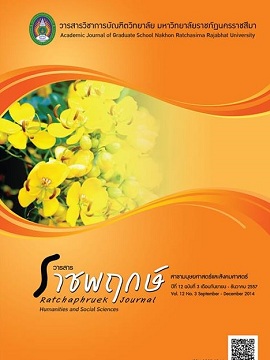A Model for Leadership’s Characteristics Development Promoting Efficiency in Network Associate Administration for the Non-Formal Education Management of District School Administrators under The Nakhon Chaiburin Group
Main Article Content
Abstract
This research aimed to study 1) the leadership characteristics of district non-formal education school administrators, 2) to explore the requirements for the development of the leadership characteristics of district non-formal education school administrators, 3) to create the model for the development of the leadership characteristics of district non-formal education school administrators and 4) to assess the suitability as well as the possibility of the model implementation. The research consisted of 5 procedures: 1) the study of the leadership characteristics of district non-formal education school administrators, 2) the study of the requirements for the development, 3) the construction of model for the development, 4) the assessment of the suitability and the possibility of the model implementation and 5) the conclusion of the model and the construction of the user manual. Research tools were a questionnaire and an assessment form. Research samples derived by using purposive samplings, were 88 district non-formal education school administrators under Nakhon Chaiburin civic group and 9 qualified persons to assess the suitability and the possibility of the model implementation. Those participants were again divided into 2 groups: (1) practitioner-level and (2) expert-level. Statistics used for data analysis were percentage, means, standard deviation and content analysis.
Research findings showed that 1) leadership characteristics that reinforce the efficiency of the network associate management for the non-formal education management of district school administrators under Nakhon Chaiburin civic group were categorized into 4 aspects: physical leadership aspect 17 characteristics), social leadership aspect 18 characteristics), personality leadership aspect 19 characteristics) and individual leadership aspect 16 characteristics) ; 2) the model for the development of the leadership characteristics of district non-formal education school administrators consisted of 3 elements: model concepts as well as principles, objectives and procedures for the development of the leadership characteristics of district non-formal education school administrators which were divided into 5 steps: preparation step, assessment step prior to development step, development step, assessment step after development step and re-development step. The assessment of the suitability as well as the possibility of the model implementation revealed that the model for he development of the leadership characteristics of district non-formal education school administrators under the Nakhon Chaiburin civic group was, in general, in the highest level. Thus, the model was considered suitable and practical.
Article Details
References
เบญจพร แก้วมีศรี. (2545). การนำเสนอรูปแบบการพัฒนาคุณลักษณะภาวะผู้นำของผู้บริหารวิทยาลัยพยาบาล สังกัดกระทรวงสาธารณสุข. วิทยานิพนธ์ครุศาสตรดุษฎีบัณฑิต สาขาบริหารการศึกษา บัณฑิตวิทยาลัย จุฬาลงกรณ์มหาวิทยาลัย.
ประสิทธิ์ เขียวศรี. (2544). การนำเสนอแบบจำลองการพัฒนาภาวะผู้นำของผู้บริหาร โรงเรียนที่บริหารโดยใช้โรงเรียนเป็นฐาน. วิทยานิพนธ์ดุษฎีบัณฑิต สาขาวิชาบริหารการศึกษา คณะครุศาสตร์ จุฬาลงกรณ์มหาวิทยาลัย.
ปาริชาติ วลัยเสถียร และคณะ. (2543). กระบวนการและเทคนิคการทำงานของนักพัฒนา. กรุงเทพฯ : สำนักงานกองทุนสนับสนุนการวิจัย.
ไพพรรณ เกียรติโชติชัย. (2545). กระบวนทัศน์ใหม่แห่งการศึกษาในศตวรรษที่ 21. กรุงเทพฯ : สำนักพิมพ์การศึกษา.
วันเพ็ญ เจริญแพทย์. (2545). การศึกษาพฤติกรรมการบริหารองค์การแห่งการเรียนรู้ของผู้บริหารโรงเรียนประถมศึกษา อำเภอบ้านค่าย จังหวัดระยอง. วิทยานิพนธ์การศึกษามหาบัณฑิต สาขาวิชาการบริหารการศึกษา บัณฑิตวิทยาลัย มหาวิทยาลัยบูรพา.
สำนักงานคณะกรรมการการศึกษาขั้นพื้นฐาน. (2541). การเรียนรู้ : ชุมทรัพย์ในคน. กรุงเทพฯ : โรงพิมพ์คุรุสภาลาดพร้าว.
สำนักงานเลขาธิการสภาการศึกษา. (2552ก). ข้อเสนอการปฏิรูปการศึกษาในทศวรรษที่สอง (พ.ศ. 2552-2561). เอกสาร สกศ. อันดับที่ 57/2552. กรุงเทพ ฯ : พริกหวานกราฟฟิค.
สำนักงานเลขาธิการสภาการศึกษา. (2554ข). นโยบายและยุทธศาสตร์การขับเคลื่อนการปฏิรูปการศึกษาในทศวรรษที่สอง ด้านการเพิ่มโอกาสทางการศึกษาและเรียนรู้. เอกสาร สกศ. อันดับที่ 3/2554. กรุงเทพฯ : วี ที ซี.
สำนักงานเลขาธิการสภาการศึกษา. (2554ค). นโยบายและยุทธศาสตร์การขับเคลื่อนการปฏิรูปการศึกษาในทศวรรษที่สอง ด้านการพัฒนาคุณภาพและมาตรฐานการศึกษาและเรียนรู้. เอกสาร สกศ. อันดับที่ 17/2554. กรุงเทพฯ : กรุงเทพฯ : วี ที ซี.
สำนักงานเลขาธิการสภาการศึกษา. (2554ง). ยุทธศาสตร์และมาตรการการปฏิรูประบบคุรุศึกษาของ ประเทศ. เอกสาร สกศ. อันดับที่ 19/2554. กรุงเทพฯ : วี ที ซี.
สำนักงานส่งเสริมการศึกษานอกระบบและการศึกษาตามอัธยาศัย. (2552). การส่งเสริมการศึกษาตลอดชีวิต. กรุงเทพฯ : รังสีการพิมพ์.
Eisner, E. (1976). “Education connoisseurship and criticism : Their form and functions in education evaluation”. Journal of Aesthetic Education. 39(2) : 192-193.
Frigon, L. and Jackson, K. (1996). The leader. New York : America.
Gardner, J. W. (1990). On leadership. New York : Free.
Wayne, K. Hoy and Cecil G Miskel. (2008). Educational Administration : Theory Research, and Practice. 8th ed. Singapore : McGraw-Hill.
Trewatha, L. Robert (1982). Management. Plano, Texas : Business.


